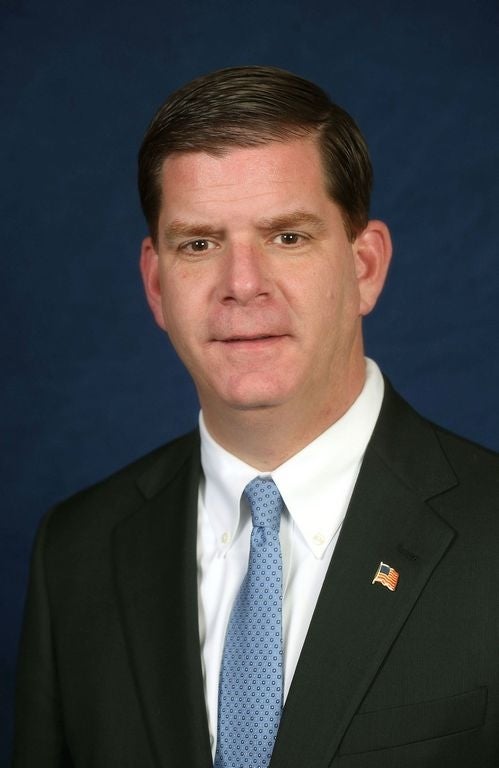The governor and mayor of Boston will make a bipartisan pitch Tuesday for a tuition-free college program available to Boston residents, but a Democrat running for governor is vying to make free public college for all part of the 2018 campaign.
Republican Gov. Charlie Baker and Democratic Mayor Martin Walsh are scheduled to highlight the Boston Bridge program, which will allow all 2017 high school graduates who live in Boston to earn a four-year degree without having to pay tuition or mandatory fees.
“College affordability too often serves as a barrier for students in the Commonwealth seeking to complete a degree, and this program is intended to provide more opportunities for a quality education,” Baker said in a statement.
Walsh, in a statement, said the Boston Bridge partnership “means that a free bachelor’s degree is within reach for all of Boston’s low-income high school students.”
Eligible students must meet federal Pell grant income standards and must enroll full-time at either Bunker Hill Community College, Roxbury Community College or Mass. Bay Community College.
While at a community college, the city of Boston will pay for each student’s tuition and mandatory fees, after accounting for Pell grants and other deductions. The students will be required to complete their associate’s degree within two-and-a-half years and then transfer to a Massachusetts public college or state university.
While the student attends a state public college or state university, the city of Boston and the state will together pay the student’s costs, excluding room and board. The student will be required to complete their bachelor’s degree within two years.
The tuition-free Boston Bridge program is similar to Boston’s Tuition Free Community College initiative and the state’s Commonwealth Commitment, both which were launched last year with similar goals.
As of March, there were 50 students enrolled in Boston’s program — which pays for up to three years of tuition and mandatory fees at the same three community colleges as the Boston Bridge program. The state’s program — which provides discounts and fee freezes for community college students who transfer to a public college or state university — had 80 students participating as of April, according to the state.
While Baker and Walsh touted Tuesday the Boston Bridge program for students who live in the city, the Democratic mayor of Newton angling to take Baker’s job next year is running with a platform that calls for free public college for all Massachusetts residents, “just like high school.”
“Does anyone in the state of Massachusetts, including you two, think that graduating with a high school degree allows someone to make ends meet in this economy? It’s fantasy,” Setti Warren, a Democratic candidate for governor, said on WGBH with co-hosts Jim Braude and Margery Eagan last week. “We know we need to offer universal public college if we are going to give people the skill set, the foundation, for opportunity. It’s one of the driving reasons for economic inequality in our state.”
Warren acknowledged that he does not have a cost estimate for his free public college plan — “the first question is what’s the cost of not doing it” — but said that raising taxes is key to making his proposal work.
“Let’s be honest about what it will take to maintain the programs we have, let’s have honest projections and let’s not be afraid to say we need more revenue,” he said. “We’ve got to raise revenue if we’re going to do what we’re doing now, as well as doing things like free public college.”
The so-called millionaire’s tax, a proposed constitutional amendment adding a 4 percent surtax on household income above $1 million, is pivotal to Warren’s platform. Supporters say the surtax could generate $1.6 billion to $2.2 billion annually to invest in education and transportation, and Warren has made the promise of that revenue central to his nascent campaign.
“We’ve got to raise revenue, we’ve got to raise folks’ taxes,” he said on WGBH. “It can’t be regressive, it does start with the millionaire’s tax but we need to look at all of our options if we’re going to tackle economic inequality in this state.”
Warren criticized Baker’s handling of the state budget and at one point appeared to suggest that the governor makes decisions willy-nilly. “Here’s the deal, as a political leader I don’t put my finger in the wind and try to decide what I’m going to do based on what way the wind’s blowing,” Warren said.
Braude asked at least three times whether Warren thinks Baker makes decisions by putting his finger in the wind, but Warren did not directly answer.
Though his sights are set on Baker and the corner office, Warren also fired a shot across the bow of Democrats on Beacon Hill who have been criticized for being too cozy with the Republican governor.
During his May 22 interview on WGBH, Warren responded to a suggestion by Braude that legislative Democrats are “part of the problem because they could fix it tomorrow, they could raise taxes tomorrow and override a veto, they could do free public higher education, they could do single payer, everything on your list” by saying the problems with state government are “not just about one person.”
“You are correct, Jim. Yes, Jim, look, there are some hard-working people in that Legislature that want to see the same things that I do. There are some Democrats though that are not in support of looking at tax expenditures, not in support of raising revenue, and then you have some Republicans up there who just don’t want to take the heat for making any cuts,” Warren said. “Business on Beacon Hill has to change, there’s a false sense of fiscal prudence that’s up there, there’s an illusion of it, it’s been happening for a long time.”

